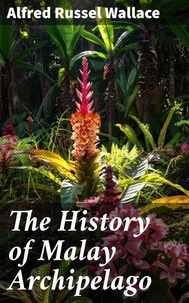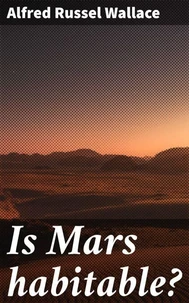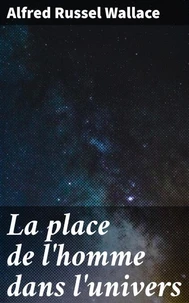The Malay Archipelago
Par :Formats :
Disponible dans votre compte client Decitre ou Furet du Nord dès validation de votre commande. Le format ePub est :
- Compatible avec une lecture sur My Vivlio (smartphone, tablette, ordinateur)
- Compatible avec une lecture sur liseuses Vivlio
- Pour les liseuses autres que Vivlio, vous devez utiliser le logiciel Adobe Digital Edition. Non compatible avec la lecture sur les liseuses Kindle, Remarkable et Sony
 , qui est-ce ?
, qui est-ce ?Notre partenaire de plateforme de lecture numérique où vous retrouverez l'ensemble de vos ebooks gratuitement
Pour en savoir plus sur nos ebooks, consultez notre aide en ligne ici
- Nombre de pages542
- FormatePub
- ISBN859-65--4700701-2
- EAN8596547007012
- Date de parution17/05/2022
- Protection num.Digital Watermarking
- Taille836 Ko
- Infos supplémentairesepub
- ÉditeurDIGICAT
Résumé
In "The Malay Archipelago, " Alfred Russel Wallace presents an engaging and meticulously detailed account of his explorations through the diverse islands of Southeast Asia. Written in a vivid and accessible style, Wallace's narrative combines his observations of natural history with profound reflections on evolution, showcasing the rich biodiversity of the region. This work is not only a travelogue but also a crucial contribution to the scientific discourse of the 19th century, where he laid the groundwork for biogeography and underscored the importance of geographical isolation in species development.
Alfred Russel Wallace, a contemporary of Charles Darwin, was a pioneering naturalist and explorer whose travels in the Malay Archipelago profoundly influenced his ideas about evolution and natural selection. His extensive fieldwork, marked by a keen eye for detail, allowed him to collect thousands of specimens and establish connections between species and their environments. Wallace's unique perspective on the interconnectedness of life and the impact of ecological factors undoubtedly shaped the insights presented in this seminal work.
"The Malay Archipelago" is essential reading for both enthusiasts of natural history and those seeking to understand the foundations of evolutionary biology. Wallace's passion for discovery and his eloquent prose invite readers to explore the complexities of nature alongside him, making this book a timeless treasure that resonates with the spirit of inquiry and adventure.
Alfred Russel Wallace, a contemporary of Charles Darwin, was a pioneering naturalist and explorer whose travels in the Malay Archipelago profoundly influenced his ideas about evolution and natural selection. His extensive fieldwork, marked by a keen eye for detail, allowed him to collect thousands of specimens and establish connections between species and their environments. Wallace's unique perspective on the interconnectedness of life and the impact of ecological factors undoubtedly shaped the insights presented in this seminal work.
"The Malay Archipelago" is essential reading for both enthusiasts of natural history and those seeking to understand the foundations of evolutionary biology. Wallace's passion for discovery and his eloquent prose invite readers to explore the complexities of nature alongside him, making this book a timeless treasure that resonates with the spirit of inquiry and adventure.
In "The Malay Archipelago, " Alfred Russel Wallace presents an engaging and meticulously detailed account of his explorations through the diverse islands of Southeast Asia. Written in a vivid and accessible style, Wallace's narrative combines his observations of natural history with profound reflections on evolution, showcasing the rich biodiversity of the region. This work is not only a travelogue but also a crucial contribution to the scientific discourse of the 19th century, where he laid the groundwork for biogeography and underscored the importance of geographical isolation in species development.
Alfred Russel Wallace, a contemporary of Charles Darwin, was a pioneering naturalist and explorer whose travels in the Malay Archipelago profoundly influenced his ideas about evolution and natural selection. His extensive fieldwork, marked by a keen eye for detail, allowed him to collect thousands of specimens and establish connections between species and their environments. Wallace's unique perspective on the interconnectedness of life and the impact of ecological factors undoubtedly shaped the insights presented in this seminal work.
"The Malay Archipelago" is essential reading for both enthusiasts of natural history and those seeking to understand the foundations of evolutionary biology. Wallace's passion for discovery and his eloquent prose invite readers to explore the complexities of nature alongside him, making this book a timeless treasure that resonates with the spirit of inquiry and adventure.
Alfred Russel Wallace, a contemporary of Charles Darwin, was a pioneering naturalist and explorer whose travels in the Malay Archipelago profoundly influenced his ideas about evolution and natural selection. His extensive fieldwork, marked by a keen eye for detail, allowed him to collect thousands of specimens and establish connections between species and their environments. Wallace's unique perspective on the interconnectedness of life and the impact of ecological factors undoubtedly shaped the insights presented in this seminal work.
"The Malay Archipelago" is essential reading for both enthusiasts of natural history and those seeking to understand the foundations of evolutionary biology. Wallace's passion for discovery and his eloquent prose invite readers to explore the complexities of nature alongside him, making this book a timeless treasure that resonates with the spirit of inquiry and adventure.







